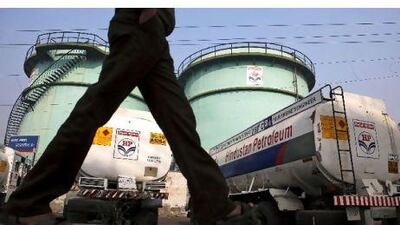Asian countries are at a risk of becoming the victims of their own success, as strong economic growth is putting a strain on global oil supplies, pushing prices to levels that threaten to turn growth into recession, International Energy Agency (IEA) officials said yesterday.
Building Brics Emerging giants
Keep pace with the emerging economic powerhouses Brazil, Russia, India, China and South Africa Learn more
The cost of importing fuels is weighing heavily on the emerging Asian economies, accounting for about 5 per cent of GDP, Richard Jones, the deputy executive director at the IEA, told delegates at a conference in Singapore.
"It's particularly sensitive in emerging markets. India is a country that has got a particularly high oil burden, they import a lot," Mr Jones was quoted as saying by Reuters. High fuel costs burden Asia's economies with rising subsidies and inflation.
Brent prices have averaged more than US$111 a barrel this year, a significant increase from last year's average of about $80. The rise in oil prices, which was exacerbated by the disruption to Libyan production, prompted comparisons with 2008, when prices briefly hit $147 a barrel.
"If $100 oil continues, it will be as bad as 2008," Nobuo Tanaka, the former head of the IEA, told the Singapore International Energy Week conference.
A Brent price of more than $100 a barrel would reduce global oil demand by about 1 million barrels per day (bpd), more than 1 per cent of world fuel consumption, Mr Tanaka said.
A recent Reuters poll of energy analysts suggests that Brent will average almost $107 a barrel next year, and above $108 a barrel in 2013. Demand from emerging economies, and China in particular, will keep pressure on prices.
High prices exacerbated the global recession in 2008, leading to a sharp decline in demand for oil, which forced producers to make record output cuts.
Wary of this scenario, Saudi Arabia, the UAE and Kuwait increased output earlier this year to compensate for the Libyan disruption, despite disagreements in Opec, where some members argued against such a move.
Mohammed Al Hamli, the UAE Minister of Energy, indicated that major Opec exporters might tolerate lower prices. Speaking at the Singapore conference, Mr Al Hamli suggested that a reasonable price for oil was $80 to $100 a barrel.
Any further decline would derail the drive to invest in new capacity, he said.
"We need a reasonable price to continue building capacity. The higher the capacity, the less fluctuation in prices, except that capacity that is not in use is very expensive," Reuters quoted the minister as saying.
The UAE is pumping 2.5 million barrels per day (bpd) from a capacity of 2.7 million bpd in response to the supply shortfall from Libya, according to Mr Al Hamli.
The country is one of three Gulf Opec members with spare capacity.
The Arab Spring has challenged the perception of the region as a stable supplier, and has made formulating an energy policy more difficult for importing countries, said a Singaporean politician.
"The recent spate of unrest in the Middle East and North Africa has generated doubt over the reliability of energy supplies from the region," S Iswaran, a minister in the Singapore prime minister's office, told conference delegates. "These events have caused increased volatility in energy markets and prices, heightening the policy challenge of governments to secure reliable and affordable energy supplies to sustain growth."

